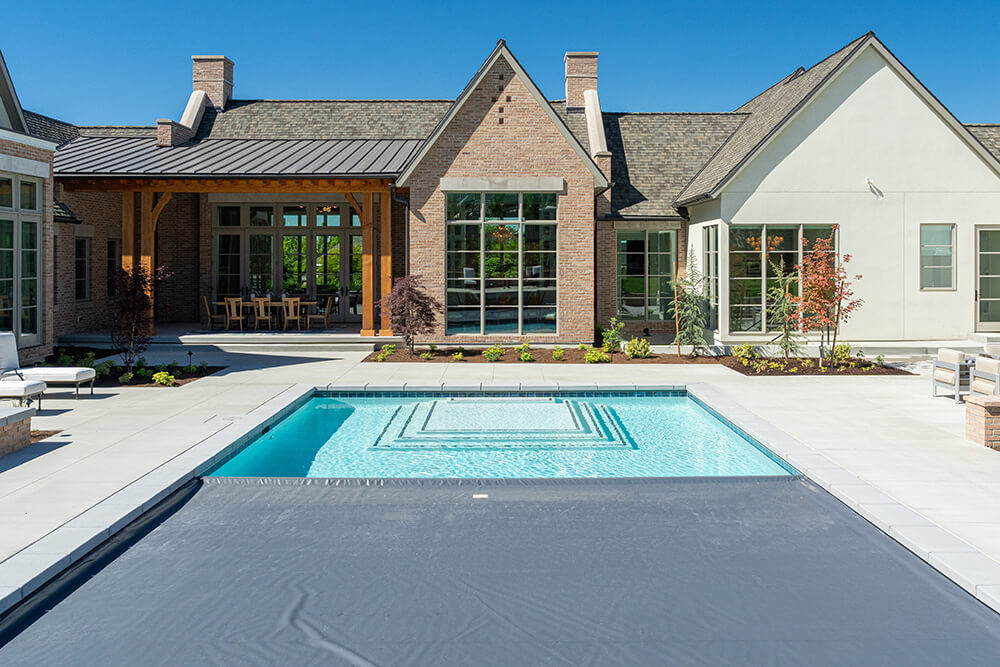When it comes to owning a pool, there are important decisions to make, and one of the most crucial is choosing between a salt water pool or a chlorine pool. Salt water pools have gained popularity in recent years as an alternative to traditional chlorine pools.
It’s essential to consider these aspects before investing in a pool, ensuring that the chosen option aligns with one’s specific needs and desires. This blog post aims to provide a comprehensive comparison of salt water pools and chlorine pools, enabling you to make an educated decision based on your individual preferences and requirements.
Understanding Salt Water Pools
Salt water pools operate through a process known as electrolysis, where salt is converted into chlorine. The salt is dissolved in the water, and an electrolytic cell produces chlorine gas, which sanitizes the pool. This unique mechanism offers several advantages over traditional chlorine pools.
Advantages of salt water pools:
- Gentler on the skin and eyes:
- The chlorine produced in salt water pools is milder, resulting in reduced skin and eye irritation.
- Swimmers can enjoy a more comfortable swimming experience without the stinging sensation or redness often associated with chlorine pools.
- Lower maintenance and cost savings in the long run:
- Continuous chlorine generation eliminates the need for regular manual dosing of chemicals.
- Less time and effort spent on pool maintenance.
- Fewer chemicals required overall, leading to potential cost savings in the long term.
- Reduced chlorine smell and irritation:
- The distinct “chlorine smell” associated with traditional pools is less noticeable in salt water pools.
- Diminished risk of skin and respiratory irritation.
However, salt water pools also come with a few disadvantages.
Disadvantages of salt water pools:
- Higher initial installation cost:
- The equipment required for a salt water pool, including the salt water generator, can be more expensive than that for a chlorine pool.
- The initial investment should be considered when choosing a pool type.
- Potential for corrosion of pool equipment and surfaces:
- Salt is corrosive, and if the salt cell or other pool components are not properly maintained, they can be susceptible to damage.
- Regular inspection and maintenance of the salt cell and pH levels are necessary to prevent corrosion
Understanding the advantages and disadvantages of salt water pools is essential in making an informed decision. While they offer benefits such as skin and eye comfort, lower long-term maintenance costs, and reduced chlorine smell, it’s crucial to consider the potential higher initial costs and the need for diligent monitoring and maintenance. By weighing these factors, individuals can determine if a salt water pool aligns with their preferences and requirements.
Exploring Chlorine Pools
Chlorine pools, also known as traditional pools, have been the longstanding choice for many pool owners. They rely on the regular addition of chlorine to sanitize the water and maintain its clarity. Understanding the features and considerations of chlorine pools is crucial for those evaluating their pool options.
Chlorine pools are widely recognized and readily available, making them a familiar choice for pool owners. The technology and products associated with chlorine pool maintenance are well-established and easily accessible. This availability ensures that pool owners can easily find chlorine-based chemicals and equipment needed for maintenance and water treatment.
Advantages of chlorine pools:
- Lower initial installation cost:
-
The equipment and components required for chlorine pools are generally less expensive.
-
This makes them a more budget-friendly option for pool installations.
-
- Widely available and familiar technology:
-
Chlorine pools are widely recognized and readily available.
-
The technology and products associated with chlorine pool maintenance are well-established and easily accessible.
-
- Effective at killing bacteria and maintaining water clarity:
-
Chlorine is highly effective at killing bacteria and maintaining the cleanliness of the pool water.
-
It ensures a safe and hygienic swimming environment for pool users.
-
Disadvantages of chlorine pools:
- Harsher on the skin and eyes:
-
Higher chlorine levels can be harsh on the skin and eyes, causing dryness, itchiness, and irritation.
-
This can be a concern for individuals with sensitive skin or allergies.
-
- Frequent chlorine maintenance and chemical adjustments required:
-
Chlorine levels in the pool water need to be regularly monitored and adjusted.
-
This ongoing maintenance includes testing the water, adding chlorine, and adjusting other chemicals as needed.
-
- Chlorine smell and potential skin and respiratory irritation:
-
The strong smell of chlorine in the pool area can be unpleasant for some individuals.
-
Prolonged exposure to chlorine fumes can potentially cause skin and respiratory irritation in sensitive individuals.
-
By exploring the advantages and disadvantages of chlorine pools, individuals can make an informed decision based on their specific requirements and preferences. While they offer advantages such as lower installation costs, widespread availability, and effective sanitization, it’s essential to consider potential drawbacks such as skin and eye irritation, frequent maintenance needs, and the distinct chlorine smell.
Factors to Consider When Choosing
When deciding between salt water pools and chlorine pools, there are several important factors to take into consideration. Each individual’s unique preferences and needs play a significant role in determining the most suitable pool type. Here are some key factors to consider:
Personal preferences and sensitivities:
-
Consider how your skin and eyes react to chlorine or salt water.
-
Think about your overall swimming experience and which pool type aligns with your preferences for comfort and enjoyment.
Budget considerations:
-
Evaluate the initial installation costs of both salt water and chlorine pools.
-
Take into account long-term maintenance costs, including chemicals and equipment replacements.
Maintenance requirements:
- Assess the amount of time and effort you are willing to invest in pool maintenance.
-
Consider the frequency of chemical adjustments, monitoring, and cleaning required for each pool type.
Environmental impact:
-
Explore the environmental implications of both pool types.
-
Consider factors such as water consumption, chemical usage, and energy efficiency.
Taking these factors into account will help you make an informed decision that suits your preferences, budget, maintenance capabilities, and environmental values. Each factor carries its own weight, and it’s crucial to find a balance that aligns with your specific circumstances and priorities.
Making an Informed Decision
When choosing between salt water pools and chlorine pools, it’s essential to make an informed decision that aligns with your needs and priorities. Consider the following steps to help you in the decision-making process:
Evaluation of individual needs and priorities:
-
Reflect on your specific requirements, preferences, and sensitivities.
-
Assess factors such as skin and eye sensitivity, desired maintenance level, and swimming experience expectations.
Weighing the pros and cons of each pool type:
-
Review the advantages and disadvantages outlined for both salt water pools and chlorine pools.
-
Consider how each pool type aligns with your personal needs and preferences.
Consulting with pool professionals or experts:
-
Seek advice from pool professionals or experts in the field.
-
Discuss your specific situation and concerns with them to gain valuable insights and guidance.
Considering alternative options such as salt water chlorine generators:
-
Explore alternative options that bridge the gap between salt water and chlorine pools.
-
Salt water chlorine generators can offer a compromise, providing the benefits of salt water with the convenience of automated chlorine generation.
By following these steps, you can make a well-informed decision that takes into account your individual needs, weighs the pros and cons, seeks expert advice, and explores alternative options. Remember that choosing the right pool type is a personal decision that should be based on thorough consideration and alignment with your preferences and priorities.
Conclusion
In conclusion, this blog post has explored the comparison between salt water pools and chlorine pools, providing valuable insights to help you make an informed decision. Let’s recap the key points discussed:
-
Salt water pools use electrolysis to convert salt into chlorine, offering advantages such as being gentler on the skin and eyes, lower long-term maintenance costs, and reduced chlorine smell.
-
Chlorine pools are the traditional choice, with advantages including lower initial installation costs, widespread availability, and effective bacteria-killing properties.
-
Factors to consider when choosing between the two pool types include personal preferences and sensitivities, budget considerations, maintenance requirements, and environmental impact.
-
Making an informed decision involves evaluating individual needs, weighing the pros and cons, seeking expert advice, and exploring alternative options like salt water chlorine generators.
It’s important to remember that the choice between salt water pools and chlorine pools ultimately depends on your personal preferences and needs. By considering the factors discussed and thoroughly evaluating your priorities, you can make a decision that aligns with your specific requirements.
The ongoing debate between salt water pools and chlorine pools continues, with proponents on both sides. However, the most crucial aspect is finding the pool type that best suits you and your swimming experience.
As you move forward, I encourage you to conduct further research and explore additional pool options. Consult pool professionals, gather more information, and assess different technologies to ensure you choose the pool type that will provide you with the most enjoyable and satisfying swimming experience.
Ultimately, the goal is to create a pool environment that meets your needs, enhances your well-being, and allows you to fully enjoy the benefits of owning a pool.


